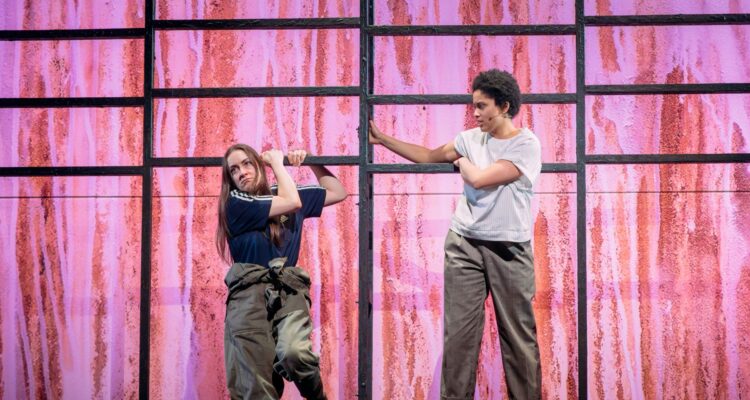This ambitious but ultimately bloodless adaptation of Lewis Grassic Gibbon’s 1932 classic novel should be lauded for its brave efforts, but ultimately falls short of its lofty ideals. Like the novel, the play tells the story of Chris Guthrie, a young woman living in rural Scotland as modernisation and war bring a way of life to a close at the start of the twentieth century.
Chris is raised by her abusive father and her worn-down mother in the fictional hamlet of Kinraddie, populated by a mix of pious church-folk, socialists and conscientious objectors. The numerous characters are depicted by the multi-talented cast, who flit from instrument to instrument and character to character with barely a breath between. This rush can lead to some confusion, as characters are not successfully delineated and it is not always clear who an actor is playing at any one time.
The sense of being rushed is a criticism that can be levelled at the play as a whole. Some scenes and vital plot points are flown past so fast as to lose all meaning. The dehumanising effects of war on young men and the unthinking destruction modernisation wreaks are present in the book but only barely hinted at by hurried scenes in the play. These moments contribute to a play that frequently feels frenetic, even while the production as a whole feels overlong.
The scenes that do work are often mightily effective. The clashes between Chris’ brother Will (Naomi Stirrat) and father (Ali Craig) are tense and unpleasant. Musings of young men at home from the Western Front are freighted with poignancy. A scene of marital rape is brutal in its restrained staging.
Unfortunately, most of the other graphic, often crucial moments take place offstage or lack power. For a play rooted in the earthy realities of early-twentieth century farming and based on a novel that originally shocked readers with its frank depictions of sex and childbirth, this production is disappointingly neutered.
Danielle Jam works admirably hard, if not always successfully, to capture the complex duality at the heart of Chris; herself a metaphor for a changing Scotland as she is torn between her Scots roots in the land and her desire to become a school-educated teacher. Strongest amongst the supporting cast is Sam Pashby as conscientious objector Long Rob, a natural, admirable acting presence who also manages to play every musical instrument presented to him with aplomb. Kirsten Henderson lights up the stage in her all-too-brief appearances as Chris’s friend Marget.
The characters stomp around a striking set filled with dry brown earth, simultaneously suggesting the richness of the fields and the mud of the trenches. There is more than a hint of Pina Bausch’s staging of The Rite of Spring as well, wholly appropriate with its themes of fertility. The intriguing, ambiguous backdrop sometimes suggests rain-washed windows, at other times blazing fields of summer corn.
The novel was written at a fractious moment in Scottish history, commenting on modernisation, the brutalising nature of war, male aggression and female disempowerment. It is a frank, powerful account of a way of life that would never be the same again. For all its bold ambition, by trying to cram too much in, this production of Sunset Song fails to capture the thematic complexities of the original.
Written by Morna Young from the novel by Lewis Grassic Gibbon
Directed by Finn den Hertog
Cast: Ali Craig, Murray Fraser, Rori Hawthorn, Kirsten Henderson, Danielle Jam, Sam Pashby, Ann Louise Ross, Naomi Stirrat
Runs until Saturday 8 June 2024
Times: 19:30 Tuesday-Saturday, 14:30 Saturdays and Wednesdays
Running time: 2 hours 40 minutes including interval

